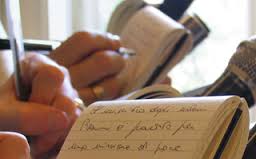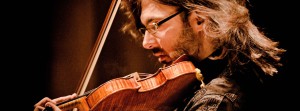This past weekend, acclaimed violinist Leonidas Kavakos performed the Sibelius Violin Concerto with the San Francisco Symphony. As you might know, I’m a big fan of this concerto. (Elaborated HERE.) I found Kavakos’ interpretation to be magnificent. Soul-stirring. No, not perfect. Sometimes a note didn’t land precisely right on the money. And there were moments where the pacing seemed to involve conductor Michael Tilson Thomas trying to keep up with Kavakos’ propulsive playing. But that’s the third movement of the Sibelius for you. In my mind, the performance transcended the tiny flaws; it transcended everything. It had such power. Kavakos had found that place of haunting, bittersweet beauty, where technical brilliance meets vulnerability, and he played the concerto, particularly the second movement, from that space. The performance was so wonderful, in some ways, because there were some imperfections. It lent the piece humanity.
Joshua Kosman, longtime music critic for the San Francisco Chronicle didn’t like Kavakos’ interpretation quite so much as I. Here’s what he had to say. “It was an awkward, unpersuasive performance, wayward of pitch and rhythm and marked by what seemed like the violinist’s utter indifference to what the orchestra was doing at any given moment. Thomas’ efforts to keep everyone together were practically poignant.” (You can find the whole review HERE.)
Well. Ouch. I should mention that I saw Sunday afternoon’s performance and Kosman reviewed Thursday night’s performance. I understand what Kosman was saying, however; I saw glimmers of this within Sunday’s performance. But, even reading this, I will stand my ground. This was one of the most stirring performances of the Sibelius I’ve ever seen.
So. Was it a wildly successful performance, or an uneven one? Should the critic have bashed Kavakos’ performance so unequivocally, or was he simply doing his job?
He was doing his job, of course. I myself have a gig as a dance reviewer for Bachtrack.com, whereby I attend ballet performances as a member of the press. It’s a funky feeling, being there as a judge. After the first review I submitted, back in October 2013, the editor responded by saying, “well, it sounds like you really enjoyed it — this is a very kind review — but it’s got to have something you found lacking, for balance. It’s got to be objective. You’ve got to be objective, as a member of the press.”
Dang. Not my skill. And it’s one of the reasons that I love attending the symphony simply as a subscriber. I like not being objective. I like riding the storm of my subjectivity. I like getting weepy and effusive and gushing out, “it stirred my soul,” and “whoa, Kleenex box, please!”
So. I loved Kavakos’ performance. I was so blown away by its power that I all but leapt to my feet right at the end, cheering Kavakos and the SFS musicians. What an astonishing ride he’d taken us on. But I looked around me and realized not everyone seemed to feel the same. Others in the audience were sitting, clapping politely. That was all. Really? I thought. Really? Was it those missed notes that had people thinking it was like a figure skating score in the Olympics, where points got deducted, and therefore the performance didn’t merit a standing ovation? Did he not look glossy enough, or sway enough, for their tastes? Eventually others rose, some in an almost dutiful sense, and Kavakos got the standing ovation his performance merited.
A first bow, amid now-enthusiastic applause. Called back for a second bow, amid the applause. But then the applause died down, too soon, which filled me with dismay. The guy deserved to come out for a third bow, minimum. I clapped more furiously, but alas, I am but one pair of clapping hands.
Then something interesting happened. As the applause died, there was a low, soft rumbling sound, and I realized it was coming from the stage, the musicians’ feet. It was their way of applauding, because of course their hands are full of instruments. The musicians were in agreement with me, apparently. Kavakos’ performance was far too good to let him walk off with only two bows.
It was the coolest thing, that soft thudding sound of their feet, the string players’ bows tapping against their music stands, broad smiles on all the musicians’ faces. Watching it, my heart swelled. Can a soloist have any greater compliment paid than this? A roaring audience, okay, fine, good for the ego. But there’s a sort of herd mentality about a roaring standing ovation. I have succumbed to it myself, rising to my feet because everyone around me did (usually this is one of the superstar soloists with a household name who’d produced a technically flawless performance, quite possibly at the expense of a sense of genuine heart). But when every member of the orchestra is beaming, thumping their feet, well, that’s saying something. Because a fellow musician understands. It’s not about the missing notes. It’s about finding the heart of the piece, the burning core, the composer’s intention, and sharing this gem with the audience.
Happily, the audience picked up the applauding pace once again, keeping at it till Kavakos came back onstage for one more bow. And as a reward, we were treated to a gorgeous, crystalline Bach partita encore. Nice.
Kosman’s review went on to praise the rest of the performance, and indeed, the two other pieces, Sibelius’ “The Swan of Tuonela” and Schumann’s “Rhenish” Symphony, were both brilliantly rendered. I loved everything about the entire afternoon’s performance. But I’ll tell you what. During that 100 minute ride home, down the Peninsula and through the mountains, it was Kavakos’ rendition of the Sibelius that still gripped at my heart. That, and the image of all the musicians of the San Francisco Symphony stomping their feet in praise of another artist.
Well done, San Francisco Symphony.



Recently, I talked to a friend, who is a professional musician, and who was unhappy with his performance on a certain day. As a member of the audience, I had noticed a few little mistakes, but had forgotten about them as the music went on. I am not a critic, so it is not my job to note all the little flaws, which might be there. I, too, like to ride the storm of subjectivity.
Oh, but don’t we both know so well, the feeling of dancing and making that little error that no one besides ourselves will remember beyond a few seconds? Flaws are toughest on the performer. Part of the arts trade; the muse is merciless.
I agree completely. I saw the Saturday night performance and was dumbstruck by the experience. I noticed a couple notes that sounded slightly off, but it didn’t dampen my appreciation for the entire performance. He received a solid three or four bows worth of standing ovations which was nice. What specifically was that Bach encore if I may ask? Loved reading your thoughts on this!
Carl, so great to read your comments, too! I love having the opportunity to chat with someone else who saw the same performance (okay, the same performer, different performances). Glad to hear the Sat pm crowd gave him the ovation he deserved. You know, I should have factored that in to my thinking, when the Sun matinee crowd was sluggish about applauding. That is quite often the case. I much prefer the Sat pm crowd – such wonderful vibrancy and energy within the audience, but the daytime jaunt from the Santa Cruz Mountains, where I live, is so much easier.
I don’t know what specifically his encore piece was; I’m almost certain it was a Bach partita on Sunday afternoon, but don’t know which one. I’d be curious to know, too. It was so lovely. And an interesting thing at the end: when he’d pulled the bow across the strings for that last note, and lifted the bow, he stayed in that position, frozen, for a good ten seconds. It was fascinating to observe. It’s like the music had such a grip on him, it was still there hovering in the air, and he couldn’t move until something inside of him allowed him to. Well, maybe that’s being fanciful. But clearly he was cast under the music’s spell, that lasted several beats into the silence that followed. So intriguing to observe!
Thanks for commenting!
I too find it really great when the artist seems as enchanted as I feel. 🙂 Something else I noticed, he seemed really noticeably humble. I know that may sound ridiculous, but he actually hugged the concertmaster after his performance and was very deferential to the orchestra during his ovations. While I’ve seen similar gestures from other soloists before, his seemed somehow more. Certainly he seemed appreciated by the Symphony though I didn’t experience the foot tapping you described from Sunday’s show. I guess it comes down to me being new to the symphony in general. I didn’t start attending till about a year ago and so it all feels new and fresh to me regardless of how old the music actually is. 🙂 And Kavakos really seemed like engaged and down-to-earth if that makes any sense. Definitely a performance to remember.
I just got an email back from the SFS about the encore. Thought you may want to know.
“Mr. Kavakos performed Ruggiero Ricci’s intricate transcription of Tarrega’s guitar piece Recuerdos de la Alhambra as his encore.”
Carl
Sorry for so many posts. I did read an article saying the encore was a Bach partita but I just listened to the piece the SFS email said and it was definitely the one he played Saturday night. Perhaps he played different encores. Sorry for the confusion. 🙂
Yes, yes! Agreed on all that you wrote! I absolutely love Joshua Bell’s interpretation of the Sibelius, but I’ve never picked up what you described, that deference and humbleness. I read a review somewhere that called him “a musician’s musician” and that made perfect sense to me.
I’ve had this subscription to the symphony for 9 years now, and have never seen that foot-tapping applause from the musicians, for a soloist. (There is, quite commonly, some mild antipathy between the two factions.) I noticed the foot tapping for the first time ever, just last season, when they foot-tap-applauded the guest conductor. Very cool, especially because there, too, you can have some “opposite sides of the camp”, between conductor and musicians.
…And you can never post too many posts here, Carl. I’m enjoying them all!
Definitely two different encores, and I would have LOVED to hear the one he did for the Saturday night crowd.
And I’m smiling now, thinking of one concert, about 5 years ago, where the audience wouldn’t stop clapping for Anne Sophie Mutter, and she offered a whopping THREE encore pieces (between rounds of leaving the stage and coming out for more bows, more bows, etc). Have never seen something like that, either before or after.
And yay that you started attending the symphony!! I STILL find it all new and fresh, even approaching a decade as a subscribe. Just love the stuff. So different from the rest of my chaotic life. : /
That experience with Anne Sophie Mutter sounds really great. I saw her play the Tchaikovsky piano trio at the Green Music Center in Rohnert Park a year or so ago and it was incredible. If you will indulge a silly question, who are some of your favorite composers?
Okay, Carl… ((Draws deep breath)):
Chopin, Tchaikovsky, Dvorak, Saint-Saens, Fauré, Sibelius, Grieg, Ravel, Mahler, Schumann, Bruch, Cesar Franck, Korngold, Wieniawski (his violin concerto!), Mendelssohn, Brahms, Beethoven (esp his violin concerto) and I could go on and on but you get the idea. The Mainstream and Late Romantics. Am growing fonder of the early 20th century stuff, and into the mid-20th. (Barber Violin Concerto!) The atonal stuff, I really have to work to like. But, that said, I could still go on and on. Shostakovich. Bartok. Elgar. Et cetera.
Ahhh….lovely list. I too gravitate towards the romantic period. Tchaikovsky, Rachmaninoff, Beethoven, and Mahler I’m especially fond of. Love works by Bruckner, Dvorak, Chopin, Mozart too. I will freely admit to not much caring for the modern atonal stuff. I’ve heard examples played at the symphony many times, but I just can’t get into it. But I guess it’s something different anyway. 🙂
Carl, I credit the San Francisco Symphony and their smart programming for the reason I’ve listened to any atonal/12-tone music at all. They slip it in, in small servings, or else with some “comfort food” (i.e.: our lists above) symphony in the program. Also, the program notes, usually written by the late Michael Steinberg, tell such a great story about the piece. His history on the Berg Violin Concerto made me just love the concerto so much. Wow, what heart I wouldn’t have otherwise picked up. Now, the Schoenberg Violin Concerto, sadly, I cannot warm to. No amount of program notes are going to help me there! And one time the SFS did a world premier of a John Adams symphony. It lasted sixty minutes, or even more (sure felt like more) and I was so bored and sleepy and unsatisfied by the end. Actually, I was grateful, come to think of it, because it had finally ENDED. It was asking a bit too much from a mainstream audience, in my mind.
Mozart: I don’t regularly choose his very lovely music to listen to, but I’m wildly enamored of every piece of his music presented in the movie AMADEUS. What a fantastic combination of drama, history, legendary music and, well, Hollywood. Sometimes they really do hit the ball out of the park. Maybe I should feel sheepish in referencing a movie as the source of my Mozartian preferences, but, well, there it is. (LOL, I think that’s what the King kept saying in the movie.)
I totally agree. I heard a John Adams piece as well (Chamber Symphony I believe it was called) that was certainly not an hour long but absolutely felt like it. Definitely outside my interest. And as far as Mozart goes, I really adore a number of his piano concertos which is why I listed him, but I haven’t connected to virtually any of his other genres. But I’ve not heard his legendary operas yet. And Amadeus is currently in my Netflix que. As film is another of my great loves, you needn’t feel sheepish for using that as a reference point. I totally understand. I’ve not heard the Berg or Schoenberg violin concertos. But the one piece by Schoenberg that I have heard doesn’t inspire much of a desire. And upon further review of your composer list, there’s at least one work by virtually all of them that I’ve already fallen in love with. A great group indeed. I just saw the SFS a few days back do Saint-Saëns’ Symphony #3 which is one of my very favorites. So gorgeous. Anyway, have a good weekend!